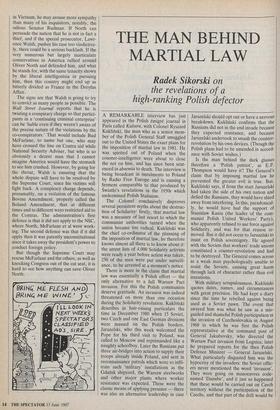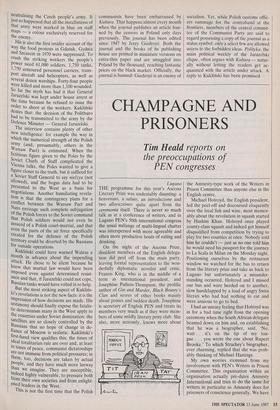THE MAN BEHIND MARTIAL LAW
Radek Sikorski on
the revelations of a high-ranking Polish defector
A REMARKABLE interview has just appeared in the Polish émigré journal in Paris called Kultura, with Colonel Ryszard Kuklidski, the man who as a senior mem- ber of the Polish General Staff smuggled out to the United States the exact plans for the imposition of martial law in 1981. He was spirited out of Poland when the counter-intelligence were about to close the net on him, and has since been sent- enced in absentia to death. The interview is being broadcast in instalments to Poland by Radio Free Europe and is causing a ferment comparable to that produced by Swiatlo's revelations in the 1950s which undermined Polish Stalinism.
The Colonel conclusively disproves several persistent myths about the destruc- tion of Solidarity: firstly, that martial law was a measure of last resort to which the communist authorities turned when the union became too radical. Kuklidski was the chief co-ordinator of the planning of the imposition of martial law, he therefore knows almost all there is to know about it: the arrest lists of 4,000 Solidarity activists were ready a year before action was taken, 250 of the men were put under surveill- ance, to be arrested at a moment's notice.
There is more in the claim that martial law was essentially a Polish effort — the only alternative to a full Warsaw Pact invasion. For this the Polish communists deserve gratitude. An invasion was indeed threatened on more than one occasion during the Solidarity revolution. Kuklidski describes in hair-raising particulars the time in December 1980 when 15 Soviet, two Czech and one East German divisions were massed on the Polish borders. Jaruzelski, who this week welcomed the Pope for his third visit to Poland, was called to Moscow and reprimanded like a naughty schoolboy. Later the Russians put three air-bridges into action to supply their troops already inside Poland, and sent in reconnaissance patrols which were to infil- trate such 'military' installations as the Gdarisk shipyard, the Warsaw steelworks and other major plants where worker resistance was expected. These were the classic means of applying pressure — there was also an alternative leadership in case Jaruzelski should opt out or have a nervous breakdown. Kuklidski confirms that the Russians did not in the end invade because they expected resistance, and because Jaruzelski undertook to smash the counter- revolution by his own devices. (Though the Polish plans had to be amended in accord- ance with Soviet wishes.) Is the man behind the dark glasses therefore a 'Polish patriot', as E.P- Thompson would have it? The General's claim that by imposing martial law he prevented the greater evil is true. But, Kuklidski says, if from the start Jaruzelski had taken the side of his own nation and defied the Russians, they would have shied away from interfering. In this, paradoxical- ly, he would have had the support of Stanislaw Kania (the leader of the com- munist Polish United Workers' Party), who apparently refused to use force against Solidarity, and was for that reason re- moved. But it did not occur to Jaruzelski to insist on Polish sovereignty. He agreed with the Soviets that workers' trade unions constituted a counter-revolution and had to be destroyed. The General comes across as a weak man psychologically unable to resist the Soviets, causing great harm through lack of character rather than evil intentions.
With military scrupulousness, Kuklidski quotes dates, names, and circumstances with great precision. He had kept a diary since the time he rebelled against being used as a Soviet pawn. The event that swayed him was what he saw as a mis- guided and shameful Polish participation in the invasion of Czechoslovakia in August 1968 in which he was first the Polish representative at the command post of General Jakubovsky, who directed the Warsaw Pact invasion from Legnica; later he prepared reports for the then Polish Defence Minister — General Jaruzelski. What particularly disgusted him was the hypocrisy of the invaders: the Soviet offic- ers never mentioned the word 'invasion'. They were going on manoeuvres code- named 'Danube', and it just so happened that these would be carried out on Czech territory without the participation of the Czechs, and that part of the drill would be neutralising the Czech people's army. It just so happened that all the installations of that army were marked in blue on staff maps — a colour exclusively reserved for the enemy. His is also the first insider account of the way the food protests in Gdansk, Gydnia and Szczecin in 1970 were suppressed. To crush the striking workers the people's power need 61,000 soldiers, 1,750 tanks, 1,750 armoured personnel carriers, trans- port aircraft and helicopters, as well as several dozen warships. Forty-four people were killed and more than 1,100 wounded. So far the myth has had it that General Jaruzelski was kept under house arrest at the time because he refused to issue the order to shoot at the workers. Kuklit%ski denies that: the decision of the Politburo had to be transmitted to the army by the Defence Minister — General Jaruzelski.
The interview contains plenty of other new intelligence: for example the way in which the numerical strength of the Polish army (and, presumably, others in the Warsaw Pact) is estimated. When the fictitious figure given to the Poles by the Soviet Chiefs of Staff complicated the Vienna talks, the Poles wanted to give a figure closer to the truth, but it sufficed for a Soviet Staff General to say nielzya (not allowed), and the bogus data had to be presented to the West as a basis for negotiations. Another humiliating revela- tion is that the contingency plans for a conflict between the Warsaw Pact and Nato envisage such complete subjugation of the Polish forces to the Soviet command that Polish soldiers would not even be assured of a Polish court-martial, and that even the parts of the air force specifically created for the defence of the Polish territory could be diverted by the Russians for outside operations.
Kuklitiski could have warned Walesa a month in advance about the impending attack. He chose to be silent because he knew that martial law would have been imposed even against determined resist- ance and that, if Jaruzelski could not cope, Russian tanks would have rolled in to help. But the most striking aspect of Kuklins- ki's revelations is not the new facts: it is the impression of how decisions are made. His testimony should finally expose the fatalis- tic determinism many in the West apply to the countries under Soviet domination: the satellites are so closely controlled by the Russians that no hope of change in de- fiance of Mosdow is realistic. Kuklifiski's first-hand view qualifies this: the times of ideal totalitarian rule are over and, at least in times of peace, communist dictatorships are not immune from political pressures; in them, too, decisions are taken by actual people, and they have much more leeway than we imagine. They are susceptible, indeed highly vulnerable, to pressure both from their own societies and from enlight- ened leaders in the West.
This is not the first time that the Polish communists have been embarrassed by Kultura. That happens almost every month when the journal publishes an article ban- ned by the censors in Poland only days previously. The journal has been edited since 1947 by Jerzy Giedroye. Both the journal and the books of its publishing house are printed in miniature versions on extra-thin paper and are smuggled into Poland by the thousand, reaching fantastic prices on the black market. Officially, the journal is banned: Giedroy6 is an enemy of socialism. Yet, while Polish customs offic- ers rummage for the contraband at the frontiers, members of the central commit- tee of the Communist Party are said to regard possessing a copy of the journal as a status symbol: only a select few are allowed access to the forbidden ideas. Polityka, the main political weekly of the Jaruzelski clique, often argues with Kultura — natur- ally without letting the readers get ac- quainted with the article under attack. A reply to Kuklitiski has been promised.




























































 Previous page
Previous page